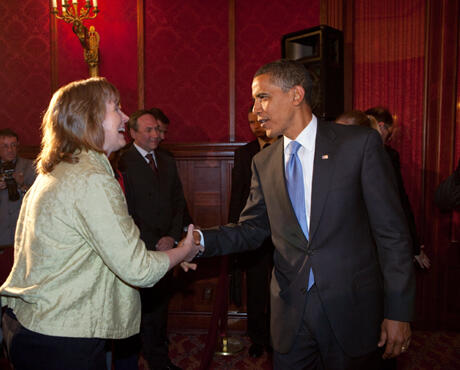Aug. 26, 2009
VCU professor participated in the U.S.-Russia Civil Society Summit and chaired a group that offers public health recommendations to President Obama
Share this story

Judyth L. Twigg, Ph.D., associate professor of political science in the L. Douglas Wilder School of Government and Public Affairs, participated in the U.S.-Russia Civil Society Summit held in Moscow last month. The bilateral summit was aimed at promoting greater cooperation and encouraging engagement between the two countries and coincided with a summit meeting between President Barack Obama and Russian President Dmitri Medvedev.
“This was an opportunity for Americans and Russians, together, to figure out what we have in common and find ways to work together,” Twigg said.
About 100 participants from the United States and Russia met on July 6 and 7 to discuss collaborative projects and to provide policy advice to the presidents on public health, community development, human rights and rule of law, youth and education, press and new media and the environment. Twigg chaired the working group that focused on public health.
“One of the most inspiring ideas to come out of the conference was a real push for using technology to promote public health,” Twigg said. “One idea was to build a Web-based consumer ratings platform to provide an opportunity for consumers to learn about health providers, see what other consumers think about a particular provider and share their own impressions. We also discussed collecting data and making the data available online to promote healthier outcomes.”
Cell phones are more common than home phones in Russia and summit participants considered new ideas for providing health information through text messages.
“There was a ‘texting for babies’ idea in which medical providers text pregnant women with important reminders about health appointments and offer tips during the pregnancy. It’s not a hard sell to a pregnant woman,” Twigg said.
Twigg said the summit broke away from the one-sided tradition of similar meetings in which the United States offers expertise and foreign aid to Russia.
“This conference went beyond offering condescending assistance to an atmosphere of collaborative engagement and mutual respect. While there’s much we can teach the Russians, they can also teach us. Throughout much of their history they’ve learned to do things less expensively. In that regard, we have a lot to learn from them,” Twigg said.
Obama spoke to participants during the second day of the summit and Twigg had a front-row seat. At the conclusion of his address, the president was presented a list of each working group’s recommendations.
“It was terrific to see a new American president engaged with Russia in a positive way. I’m more hopeful than I’ve been in years about the relationship between the U.S. and Russia and glad we contributed something positive to public health in both countries,” Twigg said.
Subscribe to VCU News
Subscribe to VCU News at newsletter.vcu.edu and receive a selection of stories, videos, photos, news clips and event listings in your inbox.







